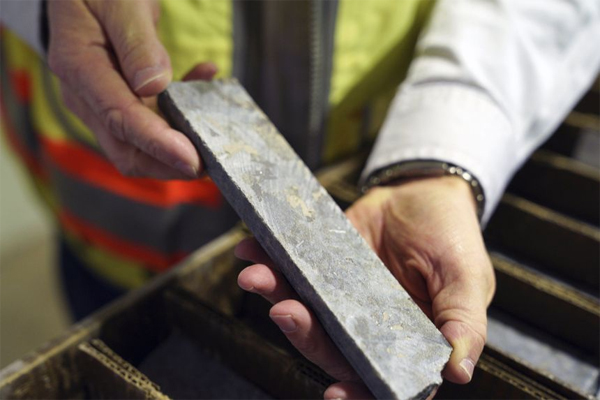
By Dennis Blais
President Biden recently invoked the Defense Production Act to boost supplies of the minerals needed to power electric vehicles and reduce America’s oil dependency. Yet, even with this welcome executive action, the U.S. can’t produce enough of some minerals, such as nickel. America must rely on undependable, often hostile foreign-controlled sources for these key materials. There is an alternative: finding politically safe, economically viable and ecologically responsible ways to get these minerals somewhere else, including the depths of the oceans.
Nickel is the metal currently most responsible for providing range in electric-vehicle batteries. Global nickel demand for batteries is forecast to grow 20 to 25 times by 2040, and market analysts expect significant shortages in two to three years. Russia is one of the largest suppliers of class 1 battery-grade nickel, and Chinese interests control production elsewhere in Asia, mostly underneath rainforests in the Philippines, New Caledonia and Indonesia.
To electrify half the cars and trucks Americans purchase by 2030, the Biden administration’s target, the U.S. will need to secure more than 650,000 tons of battery-grade nickel each year. Annual domestic nickel production amounts to about 18,000 tons. Recycling and conservation can go only so far. Securing new supplies of battery-grade nickel should be a priority for achieving America’s energy security goals.
Those supply options include vast sources of nickel contained in polymetallic nodules at the bottom of the Pacific Ocean. The Clarion Clipperton Zone, between Mexico and Hawaii, contains nearly twice as much nickel (along with three times as much cobalt and significantly more manganese) than all the world’s land-based reserves combined. This small patch of seafloor—in total less than 0.5% of the global seafloor—could supply key battery metals to support electrifying the global passenger fleet several times over.
The scramble for undersea mineral resources has begun. China and Russia already hold multiple exploration licenses. Because the U.S. hasn’t ratified the United Nations Convention on the Law of the Sea, there are no U.S.-held exploration contract licenses. No sovereign government or company can obtain a legal license from the International Seabed Authority without having ratified the convention. When the U.S. signed the treaty in 1994, it reserved four large seabed mining sites for American companies. After Congress failed to ratify the treaty, two of the sites were allotted to the U.K.
Fortunately, U.S. allies in Europe and Canada, which have ratified the convention, are forging ahead with deep sea mining. Prototypes have been successful and full-scale production is scheduled within the next two years. One Canadian business, the Metals Co., which is at the forefront of seabed nodule collection and processing technology, is active in the Clarion Clipperton Zone under licenses sponsored by Nauru, Tonga and Kiribati.
Nickel, cobalt and manganese extracted and processed by companies from Canada and Western Europe are certainly preferable to Chinese and Russian supplies. But they are less secure, and of less economic benefit than metals produced by American companies, though American processing of these materials would remedy some of these shortcomings.
The International Seabed Authority is working on a commercial undersea mining code that should be ready by 2023. While technologies and practices are more precise and less polluting than in decades past, there is no risk-free mining. Exploration contractors have to research the environmental effect of deep-sea mining in compliance with ISA requirements including pilot work to understand and mitigate possible adverse effects. Opposition to deep-sea mining also raises the national-security and economic risks associated with having a critical industrial material under the control of increasingly aggressive and hostile powers.
Ultimately, billions of dollars of investment in electrification, currently the best prospect for reducing U.S. oil dependency and carbon emissions, depend on solving the nickel-supply problem. Any serious critical mineral strategy must include undersea mining by the U.S., including ratification of the U.N. Convention on the Law of the Sea, and cooperation with our closest allies and partners. Otherwise, this crucial economic and national-security resource will, like too many others have done, fall under the sway of nations that don’t share our interests or values, on the environment or much else.
_______________________________________________________________________
Dennis Blair, a retired U.S. Navy admiral, is a former director of national intelligence and commander of U.S. Pacific Command. He is chairman of SAFE, an energy-security organization. Energiesnet.com does not necessarily share these views.
Editor’s Note: This article was originally published by The Wall Street Journal, on June 02, 2022. All comments posted and published on EnergiesNet.com, do not reflect either for or against the opinion expressed in the comment as an endorsement of EnergiesNet.com or Petroleumworld.
Use Notice: This site contains copyrighted material the use of which has not always been specifically authorized by the copyright owner. We are making such material available in our efforts to advance understanding of issues of environmental and humanitarian significance. We believe this constitutes a ‘fair use’ of any such copyrighted material as provided for in section 107 of the US Copyright Law. In accordance with Title 17 U.S.C. Section 107. For more information go to: http://www.law.cornell.edu/uscode/17/107.shtml.
energiesnet.com 06 03 20022












